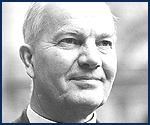Mythology or theology? And would you invite this person to a cookout?

This post was contributed by worship leader Mike Hale. Did the Council of Nicaea recommend niacin? Is Pelagianism related to plagiarism? Is the father of 70 children called a Septuagint? Does the Kenotic Theory explain the mystery of why Ken is no longer with Barbie? And can anyone you’d want to invite to a cookout even pronounce Eutychianism, what less know what it means? Okay, so you might know the answer to some of the above, but let's face it, theological sounding terms and the word ‘theology’ itself just smacks of confusing academia—and of old dead guys in the Church—and seems to have little to do with the simplicity that is in Christ. ['Dead old guy' Athanasius, pictured below, died way back in 373, and we'll get to him shortly.] Besides, all you really want to do is be able to share a prayer, a song, or a timely meaningful word with your sisters and brothers. You're not after a PhD. Perhaps you’ll find encouragem ent in the words of respected theologian ...






